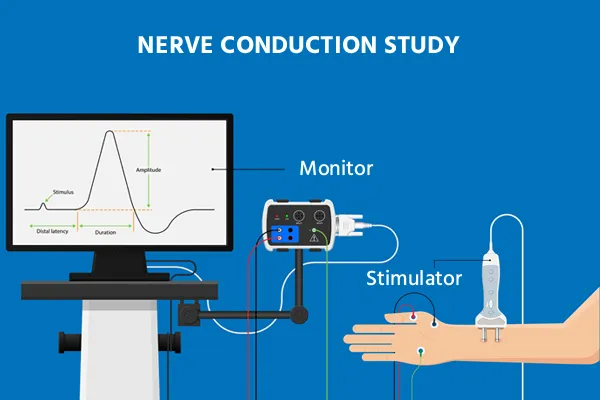What is the EMG NCV Test
The EMG NCV Test (Electromyography and Nerve Conduction Velocity test) is used to identify nerve and muscle problems, including neuropathies, carpal tunnel syndrome, sciatica, and various neck and spine conditions. It assesses the function of muscles and nerves and complements clinical evaluations and imaging tests like MRI.

Secure your health with a second opinion. Make informed decisions and book your appointment today!
Get A Second OpinionEMG NCV Test Cost in India
| Test Type | Electrodiagnostic Test |
|---|---|
| Preparation | Wear loose clothes for this test, Do not use any type of body lotion or perfume before the test |
| Report | EMG test results can be expected within 24 to 48 hours, while the NCV test can take up to 7 days |
| EMG/NCV Test costs | EMG test can cost up to Rs. 1000 to Rs. 3000, and the NCV test can cost up to Rs. 1000 to Rs. 5000, approximately |
Make sure to check with the testing facility for exact pricing in your location.
Why is the EMG and NCV Test Used
The EMG and NCV test helps diagnose muscle and nerve disorders. An EMG checks if muscles respond properly to nerve signals, while the NCV test identifies nerve damage or disease. These tests are crucial for determining whether symptoms stem from muscle or nerve issues.
Normal Range for EMG NCV Test
- The normal range for the EMG NCV test is between 50 to 60 meters per second.
- If the results fall outside this range, consult your doctor for further evaluation.
Risks of the EMG NCV Test
The risks associated with the EMG and NCV test are minimal but can include:
- Infection at the needle insertion site
- Minor bleeding, especially for those on blood thinners
- Rare chances of nerve injury in high-risk areas (e.g., diaphragm, rib cage)
Ready to take control of your health journey? Book your appointment now and start your path towards wellness today!
Book an AppointmentHow to Prepare for an EMG NCV Test
Before undergoing the EMG NCV test, follow these preparation tips:
- Take a bath or shower, but avoid using lotions or moisturizers.
- Wear loose-fitting clothes for easy movement.
- Refrain from smoking on the day of the test.
- Inform your doctor about any medications, especially if you have a pacemaker or implanted cardiac defibrillator.
Interpreting EMG NCV Test Results
After the EMG and NCV test, your doctor will review the results to diagnose potential neuromuscular disorders or nerve damage. Based on the findings, you may be referred to a specialist for further evaluation and treatment, such as medication or surgery.
The EMG NCV test is vital for identifying the underlying issues causing your symptoms and helping doctors develop an effective treatment plan.

Frequently Asked Questions
What is the EMG NCV test done?
EMG/NCV tests are done to allow physicians to determine the cause of muscle cramping, extremity weakness, spine-related issues that cause numbness and tingling sensations, and other crippling health conditions.
Is the EMG/NCV test painful?
EMG testing can be uncomfortable, but it is generally well-tolerated without pain medicine.
How long does it take to perform an EMG NCV test?
An EMG can take anywhere from 30 to 60 minutes. Nerve conduction tests can last from 15 minutes to an hour or longer. It is determined by how many muscles and nerves your doctor examines.
What is the purpose of a doctor ordering an EMG?
When a patient exhibits a muscle or nerve disorder, a doctor will likely order an EMG. These diagnoses may include tingling, numbness, or unexplained limb weakness.
What is the purpose of a nerve conduction test?
Your doctor may recommend a nerve conduction test to determine the cause of muscle or nerve symptoms. Stiffness, weakness, spasticity, numbness, tingling, or pain are symptoms. The test can diagnose nerve and muscle diseases and conditions such as ALS (amyotrophic lateral sclerosis) and myasthenia gravis.
Is it possible to have a regular EMG and have nerve damage?
A normal EMG nerve conduction study does not rule out polyneuropathy. Only large fiber polyneuropathy can be assessed using EMG nerve conduction studies. So yes, there is a chance of nerve damage even after the test.
Can you eat just before EMG?
Caffeine-containing foods (such as coffee, tea, cola, and chocolate) should be avoided 2 to 3 hours before the test.